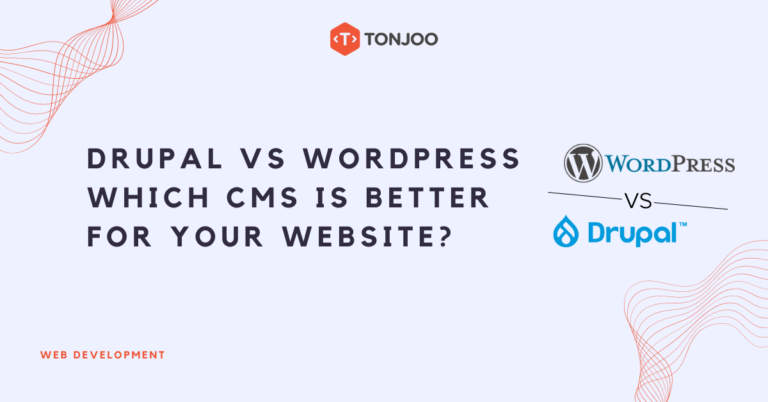
Drupal vs WordPress, which one is better? When you want to use CMS to build a website, a question like that often comes to mind.
Building a website is no easy feat, and one of the most crucial decisions you’ll make is which content management system (CMS) to use. Drupal and WordPress are two of the most popular options, but many are still on the fence about deciding.
Although not as modern as Laravel, WordPress and Drupal are popular content management systems that have been around for many years.
In this article, we’ll take a closer look at Drupal and WordPress and why we believe WordPress CMS is the superior choice for most businesses.
Table of Contents
What are Drupal and WordPress CMS
Before we dive deeper, let us explain Drupal and WordPress as CMS. For you who still don’t know what is Drupal, WordPress, or let alone CMS, this will help you understand the difference better.
What is Drupal?
Drupal is a powerful CMS that’s been around for over two decades. It’s been open source since 2001 and started gaining popularity since it was used to build DeanSpace, a 2004 US Presidential Election campaign.
It’s a highly flexible and customizable platform often used for large-scale websites with complex features and functionality.
Drupal is like a Swiss Army knife of CMS platforms – it’s got all the tools you could ever need and then some.
Need a custom content type? No problem. Want to create complex workflows? Piece of cake.
Drupal can handle just about anything you throw at it, making it the go-to choice for businesses that require a high level of flexibility and scalability.
But, like a Swiss Army knife, all that power comes with a bit of a learning curve. You’ll need to invest some time and effort to master Drupal’s intricacies.
What is WordPress?
WordPress is a user-friendly CMS that’s been around since 2003, just two years after Drupal became open source. It’s used by millions of websites, including some of the world’s biggest brands. WordPress is known for its ease of use, a vast library of plugins, and extensive support network.
WordPress is the golden retriever of CMS platforms – friendly, approachable, and always eager to please. It’s a platform that’s easy to use, even for those who aren’t tech-savvy, making it an ideal choice for businesses that want a website that looks great without all the fuss.
But don’t let its friendly exterior fool you – WordPress is also a powerhouse, with a vast library of plugins and tools that can help you customize your website to your heart’s content.
While WordPress on its bare bone lacks features, its libraries of plugins and themes also make WordPress just as customizable as Drupal. Especially with a custom WordPress plugin, you can do anything in WP as much as you can do in Drupal.
With WordPress, you’ll have a loyal companion that will always be there to help your business shine.
So which one should you choose? Continue the discussion to the Drupal vs WordPress comparison below.
Drupal Vs WordPress Comparison
So which one should you choose? When it comes to building a website, the CMS you choose can significantly impact your business’s success.
We will compare Drupal and WordPress head-to-head and explore the pros and cons of each platform, so you can make an informed decision about which one is the best fit for your business.
a. Performance
Thanks to its clean code and streamlined architecture, WordPress performance is often already good out of the gate.
However, its performance can also be further optimized through the use of caching plugins, image optimization tools, and other optimization techniques. It can be easily achieved using plugins that are easy to install on WordPress.
Additionally, many web hosting companies offer WordPress-specific hosting plans optimized for the platform, further boosting its performance. This can lead to faster page load times, a better user experience, and improved search engine rankings.
Drupal performance generally can be faster than your average WordPress site. But to get to that point, you need to invest time and resources to work on your Drupal site. Drupal’s complex architecture and flexibility make it a more powerful platform, but it requires more technical know-how to fine-tune its performance.
In short, Drupal generally has better performance. But it will drag you with resources and development time, while WordPress can also have a fast loading time with less effort.
b. Security features
In a perfect world, both WordPress and Drupal are secure systems. But in the real world, with real people’s update habits and penchant for third-party solutions), Drupal often ends up being more secure.
Drupal security features are known for their robustness. Its modules have internal security that aims to prevent malicious code from being included in the modules, making it an excellent choice for businesses that require high-level security.
If they were bouncers, Drupal is like the hulking, muscle-bound bouncer who takes his job very seriously – he’s tough, intimidating, and can handle anything that comes his way. On the other hand, WordPress is more like a friendly, approachable bouncer who still knows how to throw a punch if necessary.
While Drupal is often considered the more secure of the two platforms, WordPress has come a long way in recent years, with a large community of developers and security experts working to improve the platform’s security features. Now, various WordPress security plugins cover its security.
Ultimately, Drupal offers better website security features, although WordPress security features generally serve just fine.
c. Complexity
WordPress is generally considered to be easier to use than Drupal. Designed to be user-friendly and intuitive, WordPress is an ideal choice for businesses that don’t have a dedicated IT team.
This most popular CMS is known for its ease of use and user-friendly interface, especially for non-developers. When it has trouble, it’s easy to find solutions. A large global community also makes it easy to find support for any issues you may encounter.
On the other hand, Drupal is more complex and may require more time and effort to learn and use effectively. Drupal’s steep learning curve can be difficult for non-technical users to master.
That’s why WordPress is the go-to CMS that many businesses prefer, particularly those with limited technical expertise or resources. Only go with Drupal if you know what you’re doing or have the resources to hire an experienced developer to help you navigate the platform’s complexities.
d. Time to Develop
Generally speaking, WordPress is faster to develop than Drupal. WordPress has a more streamlined architecture and a vast library of plugins and themes that can be easily customized and integrated into a website. This makes building a website with WordPress easier and quicker, particularly for those without a technical background.
The time needed to build a WordPress Site varies from one week to one month.
On the other hand, Drupal’s complexity and flexibility can make it more time-consuming to develop. Customizing and building a website with Drupal often requires more technical expertise and resources, leading to longer development times.
So, if time is a big constraint for your website-building project, consider using WordPress instead of Drupal.
e. Cost
When it comes to development costs, Drupal is generally considered to be more expensive than WordPress. Drupal’s more complex architecture and customization options often require more technical expertise and resources, which can result in higher development costs. Additionally, Drupal often requires more server resources, which can increase hosting costs.
According to a survey conducted by Clutch in 2020, the average cost of a Drupal website is $30,000, while the average price of a WordPress website is $7,500. Of course, the actual cost will depend on various factors, including the project’s complexity, the skill level of the development team, and the availability of resources.
Drupal have higher development costs while also offering more flexibility and customization options. If your business requires a high level of customization and has the budget to support it, Drupal may be the better option.
However, if you’re looking for a more cost-effective solution that still offers a high level of customization and functionality, WordPress is the way to go.
Drupal Vs WordPress, Advantage Comparison
In short, here are some key advantages of both CMS.
Drupal Advantages:
- More powerful and flexible architecture, making it a better choice for complex, large-scale projects
- Offers more advanced customization options and features out-of-the-box
- More robust security features make it a better choice for businesses that require high-level security measures
- Better support for multi-lingual websites and complex content workflows
- Strong developer community and support resources
- suitable for websites with complex features and functionality
WordPress Advantages :
- More user-friendly and intuitive platform, making it easier to use and learn
- Offers a vast library of plugins and themes, making it easier to customize and integrate into a website
- More cost-effective and scalable option for smaller and mid-sized businesses
- Faster development time, making it easier to build and launch a website quickly
- Better SEO optimization capabilities, making it easier to drive traffic and improve search engine rankings
Drupal vs WordPress: Which CMS is Better For Your Website?
That’s a wrap for the day. WordPress is your go-to choice if you want simpler, more affordable, and faster development. Its scalability and customizability are only a hair behind drupal.
Only when you want a complex website with the ultimate security, Drupal would be the better choice.
At the end of the day, it’s not just about choosing the suitable CMS but also about creating a website that’s engaging, informative, and visually appealing. That’s why working with a team with experience in website design and development and a solid understanding of marketing and branding is important.
In conclusion, while Drupal and WordPress are excellent CMS options, we believe WordPress is the most suitable choice for most businesses. It’s user-friendly, cost-effective, and has a vast community of developers and support resources.
While looking for a suitable CMS for your website project, you can save time and fuss by working with a WordPress Website Development Company.
Tonjoo is a WordPress website development service in India and Indonesia that can help you build a just as powerful and feature-rich website as a Drupal site.
We can fulfil your unique needs and aligns with your business goals. From design and development to optimization and support, we offer a full range of services to ensure that your website is successful and drives results for your business.
We also offer Advanced WordPress Services to take your website to the next level. Whether you need a custom feature for your website, want to improve its speed and performance, or ensure its security, our team of experienced WordPress developers can help.
Contact us today to learn more about how our WordPress website development services can help your business succeed online.
Updated on March 4, 2024 by Moch. Nasikhun Amin



